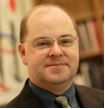Lemley Considers Whether Patent Office Can Be Fixed
 This past Friday was a memorable day for Marquette Intellectual Property & Technolgy Program. Professor Mark A. Lemley, the William H. Neukom Professor of Law at Stanford Law School, the Director of the Stanford Program in Law, Science and Technology, and a founding partner of Durie Tangri LLP, delivered the Distinguished Annual Hon. Helen Wilson Nies Lecture in Intellectual Property, “Can the Patent Office Be Fixed?”
This past Friday was a memorable day for Marquette Intellectual Property & Technolgy Program. Professor Mark A. Lemley, the William H. Neukom Professor of Law at Stanford Law School, the Director of the Stanford Program in Law, Science and Technology, and a founding partner of Durie Tangri LLP, delivered the Distinguished Annual Hon. Helen Wilson Nies Lecture in Intellectual Property, “Can the Patent Office Be Fixed?”
In the Conference Center of Marquette’s Eckstein Hall, which was filled with students, alumni, faculty, and local practitioners, Professor Lemley stressed that the United States Patent and Trademark Office (USPTO) faces primarily two problems in promoting innovation policy. On the one hand, the USPTO must contend with a backlog of around 700,000 patent applications that have not yet even been examined, let alone granted or denied. This may result in three- and five-year waits before the USPTO renders a decision on an application, which may prove detrimental for certain sectors in which technology develops at a more rapid pace, such as the software industry. On the other hand, the USPTO has granted a not insignificant number of patents of questionable validity and quality.
